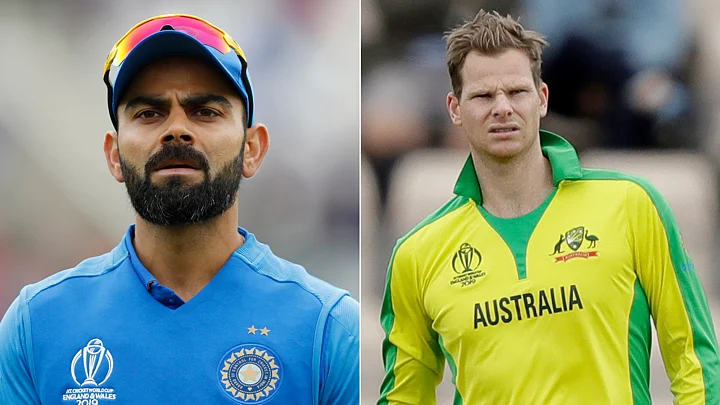It's India's turn.
Along with low scores and rabid bowlers, the opening phase of the Cricket World Cup has also been about inconsistency.
Every team which won its first match has strained in the second.
England lost to Pakistan.
West Indies lost to Australia.
Australia fought back from 79-5 against West Indies.
New Zealand stumbled over the line against Bangladesh.
Bangladesh slumped from a national ODI record of 330 in a victory, to 244 in a defeat.
India, the last team to get going in the tournament, beat the beleaguered South Africans by six wickets on 5 June in Southampton with what captain Virat Kohli described as "a professional effort."
They will need that and more on Sunday, 9 June, against Australia at the Oval in a heavyweight contest featuring teams which have won seven of the last nine World Cups. Team India will need that and more on Sunday, 9 June, against Australia at the Oval in a heavyweight contest.
They just met in a five-match series in March in India, after which both teams considered themselves winners.
Australia rallied from 2-0 down to beat India 3-2 and got its mojo back after losing six series in a row.
India wasn't all that fussed. After going 2-0 up and expecting to win, it experimented with its lineups to finalise its World Cup squad. Pressure moments were lost and lessons were heeded. Kohli declared the squad's World Cup XI was sorted. The players' workload was then managed through the Indian Premier League. They got a court-mandated late start to the World Cup, and there's conviction they are on track.
Kohli doesn't expect the batting department to be changed. The bowlers will be, however, depending on conditions. Morning starts make a difference, but Kohli boasts about not being worried about defending a low score.
"If the pitch demands us to get 260, 270, 280 or just get to 300, we know with our bowling attack any score is defendable with the kind of skill-set that we have," he says. "That is the kind of belief we have in our side. So we don't necessarily need to look at any other side based on the conditions."
He counts himself fortunate to have fast bowler Jasprit Bumrah, the top-ranked bowler in one-day international cricket. Bumrah brings "match intensity" even to the nets, Kohli says, and forces batsmen to trust their technique or any doubt will be smelled like blood to a shark.
But the Australians have their own shark, too. Mitchell Starc has returned from a pectoral muscle injury in February with the sort of form which earned him the award as player of the 2015 World Cup. He took 5-46 against the West Indies on Thursday, and said the best thing about the win was finding it when all appeared lost at 79-5. That experience was valuable, and banked.
Starc missed the series in India, as did Steve Smith and David Warner, who were still serving suspensions. Both senior batsmen have seamlessly returned to the side and helped Australia become feared again. Warner anchored the run chase in the opening win over Afghanistan with a man-of-the-match 89 not out, and Smith anchored the innings against the West Indies with 73.
India fiddled with its lineups against Australia in March, but Australia will also start this World Cup clash with a stronger squad.
Kohli says the past counts for nothing. India's main goal is to avoid the second-match blues.
"It depends on how the side turns out (on the day), what kind of mental set-up they have," he says. "We have to be mentally and skillfully stronger than the opposition, whoever we play, to win on the day. Our focus will be that."
(At The Quint, we question everything. Play an active role in shaping our journalism by becoming a member today.)
